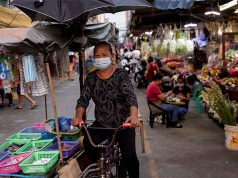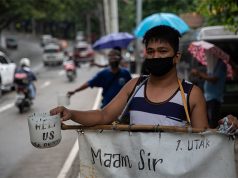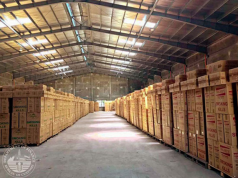MANILA – The government is expected to generate some P134 billion in revenues, and “99 percent of taxpayers will enjoy higher take-home pay” under the version of the tax reform bill approved by the Senate ways and means panel, according to its committee chairman.
The committee has approved the Palace-endorsed Tax Reform for Acceleration and Inclusion (TRAIN) bill that the House of Representatives cleared earlier, with 21 senators giving their imprimatur to the committee report. Senate Bill 1592 now goes to the plenary for debates.
Panel chairman Sen. Juan Edgardo Angara said in his sponsorship speech that genuine tax reforms were needed after two decades, and played up the Senate committee report’s focus on allowing “99 percent of taxpayers” to enjoy higher take-home pay.
“Minsan naririnig natin na mahirap para sa taumbayan na magtiwala. Kakaunti lang raw ang nakakaramdam ng serbisyo mula sa buwis. Hindi bulag ang Senado sa mga hinaing na ito. Kaya ako nakatayo rito, kabalikat ninyo, dahil totoong kailangang may magbago. Ito mismo ang hangad nitong panukalang batas,” Angara said.
[Sometimes we hear that it’s hard for people to trust government because only a few benefit from services funded by taxes. The Senate is not blind to this. I stand here now, shoulder to shoulder with you, because I share the desire for change. This bill seeks to respond to that desire].
Angara added, “Finally, after 20 years, it’s time for tax reform. It’s time to give them back more purchasing power. It’s time to give our workers what’s due them.”
Angara did not mention it on the floor, but in the initial version of his speech distributed to the media on Wednesday, the government was expected to generate P134 billion if Senate Bill 1592 were approved, or P3 billion less than the version passed in the House of Representatives.
For the economic managers of President Duterte, however, while a higher number would be ideal, the P134 billion could cover the priority programs of the administration, especially under the “Build Build Build” infrastructure drive.
In the 2018 budget, the government had put in an indicative P134 billion to be generated from tax reforms, and the Department of Finance expressed hope that whatever is ultimately drawn as a result of the TRAIN bill would not be any lower.
Finance Undersecretary Karl Kendrick Chua said they were verifying the tweaks made by senators, as “we just saw the committee report today in full, so that will take a few days to confirm.”
The DOF, he added, had “always been saying that as long as it’s above the P134 billion which is the one that’s reflected in the [2018] budget, that would be enough to fund the budget. Below that, of course, there will be some concern. If that is the number then that is a very good number.”
Lower income taxes
The version approved by Angara’s committee retained the lowering of income taxes for 99 percent of income taxpayers.
Those earning P150,000 a year pay zero taxes; while those earning up to P250,000 annually will be exempted from income tax only if they have four dependents.
In the original version of the DOF and the House, those earning P250,000 a year pay zero tax, whether or not they have children.
Higher fuel excise tax
The Senate panel-approved version also tweaked the proposed additional tax on petroleum products.
In the House version, the 6-peso additional excise tax will be spread out over three years thus: P3 on the first year [or 2018], P2 on the second [2019] and P1 on the third [2020].
The Senate version spreads out the P6 this way: P1.75 for the first year, P2 for the second, and P2.25 for the third.
The Angara panel version kept the exemption for kerosene, which DOF estimates is used as fuel by some 3 million rural families.
To avoid the inflationary impact of higher fuel excise tax, SB 1592 has a provision stopping implementation of the fuel excise tax once the price of oil hits 80 dollars a barrel.
The Angara committee also listed the sectors where the proceeds of the excise tax increases will be allocated, to ensure only the poor and deserving benefit.
Highlights of the Senate ways and means committee report, per Angara:
• The first P150,000 annual taxable income will be exempted, while retaining the P82,000 tax exemption for 13th month pay and other bonuses and the maximum P100,000 additional exemption for up to four dependents.
This translates to an approximate tax-exempt monthly income of P25,000 for workers with four dependents—in line with President Rodrigo Duterte’s campaign promise to exempt workers earning P25,000 and below from income tax.
With this proposal, based on data from the Bureau of Internal Revenue (BIR), almost all or 99% of the estimated 7.5 million individual income taxpayers will enjoy lower income tax rates.
From the current 2 million tax-exempt minimum wage earners, the proposed new tax scheme will triple the exempt income taxpayers to around 6 million.
• The bill also provided for indexation or automatic adjustment of the income tax schedule every three years so there won’t be any repeat of an outdated and unjust income tax system where lower income earners are pushed to higher tax brackets because of inflation.
“Dahil sa kakulangan sa 1997 Tax Code, lumalaki man ang sweldo, kinakain naman ng tax ang taas ng kita. Winawasto ng panukala ng Senado ang di-makatarungang sitwasyong ito, upang sa ganoon, mas mapapakinabangan ng tao ang araw-araw nilang pinagtatrabahuhan,” Angara explained.
• A distinction between the tax treatment of compensation income earners and self-employed individuals and professionals is proposed.
Under the Senate version, the 8% flat tax on gross sales or receipts is made optional so that self-employed and professionals can choose which tax rate (either 8% flat tax or schedular personal income tax rate) is more favorable to them.
“We introduced an 8% flat tax for easier compliance. Hopefully, giving them the choice of which tax regime to follow incentivizes them to pay their taxes correctly,” Angara said.
According to BIR data, self-employed and professionals only contribute 15% of the total income tax collection.
With higher income tax exemption, marginal income earners—who are self-employed individuals deriving gross sales or receipts not exceeding P100,000—will be exempt from paying income taxes. These include farmers and fisherfolk, sari-sari store owners, carinderia owners, market vendors, and tricycle drivers.
“By automatically exempting them from income tax, in effect, marginal income earners would finally be afforded equal protection and benefits that the minimum wage earners have long been enjoying,” the lawmaker said.
• The value-added tax (VAT) threshold is also raised from P1.9 million to P3 million—exempting small businesses with total annual sales of P3 million and below from paying VAT.
Micro, small, and medium enterprises (MSMEs) represent 98 percent of all registered businesses in the country, Angara noted.









